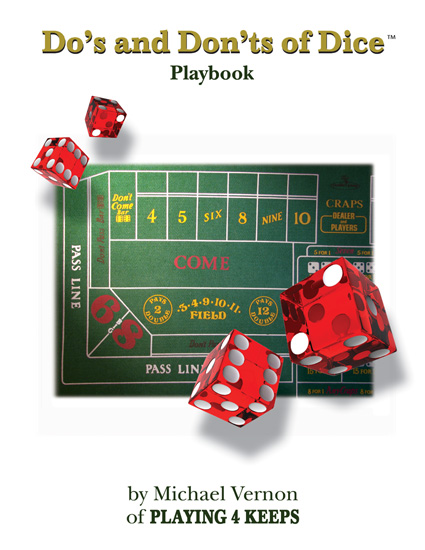|
Notes on Zero Sum
BY: Mike in Hawaii
More specifically a Zero Sum Game is one in which if you total up all the winnings and loses of all the players, you will find they add up to zero. What one player wins, some other player loses. The money goes back and forth is all.
In the case of two players, House and Player, both will see their individual long term winnings and loses close in on Zero when they are all added up. They will win about as much as they lose (over time), and that sum will get closer and closer to zero the more they play.
Now when you include a plus or minus Vig, or house advantage, or player's advantage, you are simply saying that this central point, around which individual winnings and loses wanders, has shifted.
Now one of the two sides will see their long-term sum approach different numbers. If the Vig is 5%, then one will see their individual long-term sum approach +0.05 and the other will see their individual long term sum approach -0.05. When those two are added together they still inevitably total zero because money is neither created nor destroyed in either case.
A non-Zero Sum game is one in which money can be created or destroyed. Appear or disappear magically from the game as the game is played. Money in play is always accounted for.
An contradictory example would be illegal skimming. If a crooked employee at a Craps table is pocketing chips, those chips are disappearing from the game. That is a different concept. As people legally buy in and cash out the total money in play goes up and down, but the winnings and loses continue to total zero in a Zero Sum Game.
In Craps players sometimes imagine is possible with various schemes and playing strategies to magically cause money to appear in their rails, created out of thin air, or more correctly, fast shuffles with math.
But the grizzly truth is money is neither created nor destroyed by mere mortals. You need to be a government to do that.
What does happen is a redistribution of the money in play. The good news is that this redistribution surges back and forth on short time scales. So at any given moment an individual player's chunk of the action may be more or less than they are theoretically entitled to. This is something you can do something with. Why?
Because at any given moment there will be One House and probably Many Players. You are one among many. With luck, you may find yourself holding more than your chunk of the total Player's share of the chips in play, maybe even some of the House's chips in play. If you quit at that point, you will quit with a profit.
The only way to maximize your chances of this happening is to know the mechanics, math, and methods of the game in detail. Then add on a honed situational awareness and pre-planned money management.
It is similar to "Grading on a Curve" that has become a plague in our school systems. It takes all the student grades in a class and force fits them to a standard distribution. Then it partitions out grades based on each student's position on that curve. The problem with this is symmetry. Done right you must have one F for every A that is awarded, one D for every B that is awarded and an average grade of C.
In the old days we had standard grade tables which equated grades to average percentage performance on tests and assignments by pre-established brackets. This meant if everyone worked hard, all students could earn A's. Everyone could win. In other words, it was not a Zero Sum Game.
In a Zero Sum Game it is impossible for everyone to win. Of course with a bunch of goof offs, everyone could also earn F's and then school administrators would freak and parents would go crazy. Everyone would lose. In a Zero Sum Game it is impossible for everyone to lose.
So it was decided it is better to make sure that grades are properly distributed almost independent of the amount of work done or applied. You end up with grade curves in which a "F" on a series of multiple choice tests, is just a few percentage points above statistical chance, for blind guessing. I would be similar to what you would get if you just handed out the answer sheets for students to color in and never bothered to pass out the test itself. "Graded on a Curve" looks better on paper if you cannot attain the all A's and B's (hard work) scenario. Somehow Zero Sum feels "more fair".
Well in a Zero Sum Game, for every winner there has to be a loser, maybe this is why it feels "more fair". Or more correctly, if there are many players, the total amount won must equal the total amount lost. The kicker is that lots of people may lose some and one lucky person (at any give moment) may find himself or herself holding ALL the winnings!
The question is "Will that lucky person be well trained, sensible and properly disciplined enough to quit while they are ahead?"
To quote Ian and Sylvia (Country and Northwestern Folk Singers), "The Lord made a loser so a winner could win."
The song goes on to state a fabulous truth, "Losing is an easy game."
Click Here to return to the list of prior articles ...
|
 |










